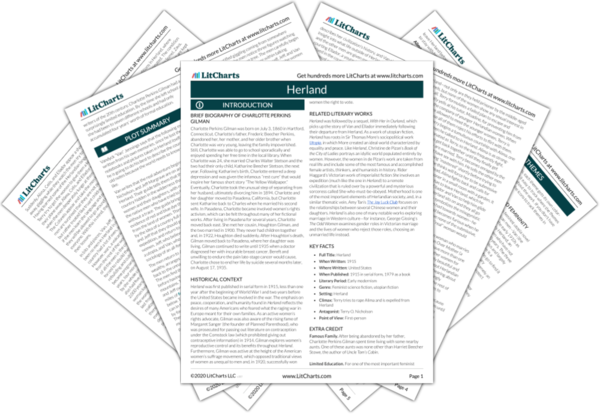Moadine Quotes in Herland
“They are a protection,” Terry insisted. “They bark if burglars try to get in.”
Then she made notes of “burglars” and went on: “because of the love which people bear to this animal.”
Zava interrupted here. “Is it the men or the women who love this animal so much?”
“Both!” insisted Terry.
“Equally?” she inquired.
And Jeff said, “Nonsense, Terry—you know men like dogs better than women do—as a whole.”
“Because they love it so much—especially men. This animal is kept shut up, or chained.”

Unlock explanations and citation info for this and every other Herland quote.
Plus so much more...
Get LitCharts A+“The children in this country are the one center and focus of all our thoughts. Every step of our advance is always considered in its effect on them—on the race. You see, we are Mothers,” she repeated, as if in that she had said it all.
“But does not each mother want her own child to bear her name?” I asked.
“No—why should she? The child has its own.”
“Why for—for identification—so people will know whose child she is.”
“We keep the most careful records,” said Somel. Each one of us has our exact line of descent all the way back to our dear First Mother. There are many reasons for doing that. But as to everyone knowing which child belongs to which mother—why should she?”
Here, as in so many other instances, we were led to feel the difference between the purely maternal and the paternal attitude of mind. The element of personal pride seemed strangely lacking.

Moadine Quotes in Herland
“They are a protection,” Terry insisted. “They bark if burglars try to get in.”
Then she made notes of “burglars” and went on: “because of the love which people bear to this animal.”
Zava interrupted here. “Is it the men or the women who love this animal so much?”
“Both!” insisted Terry.
“Equally?” she inquired.
And Jeff said, “Nonsense, Terry—you know men like dogs better than women do—as a whole.”
“Because they love it so much—especially men. This animal is kept shut up, or chained.”

Unlock explanations and citation info for this and every other Herland quote.
Plus so much more...
Get LitCharts A+“The children in this country are the one center and focus of all our thoughts. Every step of our advance is always considered in its effect on them—on the race. You see, we are Mothers,” she repeated, as if in that she had said it all.
“But does not each mother want her own child to bear her name?” I asked.
“No—why should she? The child has its own.”
“Why for—for identification—so people will know whose child she is.”
“We keep the most careful records,” said Somel. Each one of us has our exact line of descent all the way back to our dear First Mother. There are many reasons for doing that. But as to everyone knowing which child belongs to which mother—why should she?”
Here, as in so many other instances, we were led to feel the difference between the purely maternal and the paternal attitude of mind. The element of personal pride seemed strangely lacking.











